[Administrative Note] The
End of Brief Comments (04/30/2006) With this note, the
Brief Comments section on this website will cease to exist. When this
was first brought up, it was intended to capture all the smaller events that
did not merit a full blog post. In time, it was duly noted that some
of these brief comments were longer than the blog posts. Hummmppphhhh
... I also noted that the bandwidth problem in the month of April was
related to the Brief Comments, since every link to a comment resulted in
downloading the entire page with all those graphics. Most importantly,
there is a demand for those brief comments to be placed on the RSS
feed. So the best solution is to dump the Brief Comments and go with
blog posts only, even though some of them will be shorter than the
traditional ones.
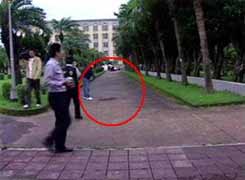
... the 59 episodes of the television show Towards The Republic covered a great deal of reassessment of historical facts. They realistically presented Yuan Shikai, Sun Yat-sen, Li Hongzhang and other historical figures. They altered the previous practice of labeling historical figures as either "good person" or "bad person." The most valuable thing about history is not assigning face masks, but providing details -- authentic details.
Unfortunately, this television drama series could not be widely shown. Three years ago, after CCTV broadcast it once, it was quickly banned afterwards. The series created too many controversies, especially with respect to the reflection and debate about Chinese democracy and constitutional government. Someone got frightened. Even in the CCTV version of Towards The Republic that was shown, many localities excised sections, especially in the last 20 episodes. Seven or eight minutes were excised from one episode.
Fortunately, I bought a set of CDs at the time. 59 episodes in eight CDs, compressed and very sharp. It can now be downloaded from the Internet via BT, but it is no longer on sale in shops. Today, I just got on the Internet to search for Towards The Republic but I found a song album by Song Zuying instead. It was hilarious.
In 1896, Li Hongzhang visited the United States and spoke with the local reporters. An American reporter asked Li if he agreed with the American and European newspaper coverage of China. Li replied this way: "The Qing nation also has newspapers. Unfortunately, the Qing editors do not dare to tell the truth to their readers. They do not tell the truth and nothing but the truth like in your newspapers. When the Qing editors speak the truth, they are very miserly and they will only speak part of the truth. Furthermore, they do not have the huge distributions of your newspapers. Since they are not honestly telling the truth, our newspapers lost the highest value of news itself and they are not a means of disseminating culture widely." You must admire Li Hongzhang. He was not in charge of news under the Qing dynasty, but he was perceptive in his remarks. He exposed his country's own flaws and spelled out the original purpose of news in search of the truth. Yet, none of this has changed much today. When Towards The Republic was banned three years ago, it further showed that our awareness of our own history and our interpretation of news is still at a shallow and superficial stage.
Of course, my position is known to be the opposite to this title. Nevertheless, in the case of the Solomon Islands, I must note that the blogs were collectively more informative than the mainstream media, even though none of the bloggers were at the scene interviewing displaced Chinese persons or otherwise speaking to VIP's. If you have not broached this subject, I ask you to first read Google News for "Solomon"+"Islands"+"Chinese" and then you can read the blogs:
The next to go for Taiwan's 25: Solomon Island? Sun-bin
The Battle of the Solomon Islands EastSouthWestNorth
Something Missing from the Solomon Islands Story China Matters
Identity, democracy and the Chinese "nation" Blood & TreasureActually, I have an even better instance of why bloggers are better than mainstream media reporters. The blogger is Richard Spencer, who is a Beijing-based reporter for the Telegraph. Here are the two blog posts of interest:
The first post began with this paragraph: "I spent last Friday at a school for migrant workers' children east of Beijing. This was in pursuit of a story which turned out not to be true, or perhaps was true but no one wanted to tell me about it, a common enough occurrence." In this case, the blogger Richard Spencer told a story in a personal way that could not be written in the newspaper while the reporter Richard Spencer did not have a story to publish. Blogger beats reporter. QED.
Of course, it might have turned out the other way as there was a story that was published in the Telegraph. But the blogger could still have told us as much.
 (AP)
(AP)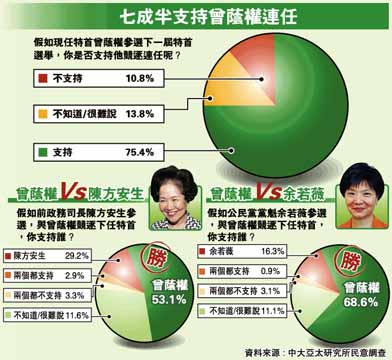

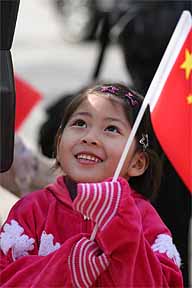

Blog as a tool of expression is supposed to be an equalizer. But not every blog is created equal. Most blogs have drawn a few hundred clicks while a few have attracted a disproportionately large number of eyeballs.
... Roland Soong does not place his blog remotely in the league of a newspaper or news agency. “The information presented on my blog is partial, selective and idiosyncratic. It would be a huge mistake to treat this as the 'best source of information' on China,” he cautions.
However, EastSouthWestNorth, or ESWN for short, is considered by many as a very good source, especially for Western media organizations based in Greater China. Writing in English, Soong in his blog both aggregates news stories with a crossover appeal and makes observations with cross-cultural acumen. “It is the effort of a single individual trying to grasp this thing known as China,” he clarifies.
Soong doesn’t see any blogger in a position to compete with traditional media, but excel in “some small niche subject area such as Integrated Circuits design or the movies of Ang Lee” or a “suddenly breaking incident.”
Both Soong and Hong Bo cite length and deadline constraints as two areas where blogs have an advantage over traditional media.
However, a blog expert, who spoke to China Daily on the condition of anonymity, calls Soong’s a one-man news agency. “Traditional media absorb the best talent, including the best from blogsphere. If these bloggers are not already on a media team, they soon will.” But he admits that for most blogs, the best it amounts to is a well-recognized column in print media.The above is just some excerpts that pertains to this blog. Read the whole thing for Keso (Hong Bo), celebrity blogs and so on.
Actually, I don't agree with the premise of the title. To paraphrase Animal Farm, "All blogs are created equal, but some are more equal than others." This is pretty standard material that you can read in Ethan Zuckerman's essay Making Room for the Third World in the Second Superpower (03/02/2004) and Clive Thomson's essay Blogs to Riches: The Haves and Have-Nots of the Blogging Boom (3/20/2006). More excerpts from Zuckerman:Clay Shirky observes that the popularity of weblogs follows a Pareto or "power law" distribution. This means that the most popular weblog is exponentially more popular, in terms of inbound links, than the 10th, the 10th an order of magnitude more popular than the 100th and so in. In other words, the vast majority of weblogs are read by only a few individuals, while a few are read by thousands of readers. These popular weblogs are "powerful", in the sense that they can direct a great deal of reader attention to a website or an issue. The authors of these weblogs - sometimes referred to as "the A-List" - have, to some extent, the ability to set the agenda for the conversation that takes place in blogspace. If A-List authors link disproportionately to stories about emerging technology and American politics, dialogue will center around those topics to the exclusion of other topics.
Shirky argues that the power law is both inevitable and "fair", in the sense that it reflects the aggregation of choices freely made by individuals into a collective will. It is, he argues, a meritocracy, where bloggers are forced to maintain a high level of quality or risk losing their audience. All this is true, but it points to a fundamental constraint within the blog universe: for an idea to gain currency, it needs a pre-existing audience. Discussions regarding intellectual property, U.S. politics, social software or peer-to-peer filesharing all can take advantage of a large audience that (Ito theorizes) amplifies good ideas and filters poor ones - a meme will succeed in this space if it is on-topic, interesting and well articulated, i.e., if it crosses a quality barrier.
Ideas on topics not well understood by a large community of bloggers have two barriers to cross: the quality barrier and a second relevancy barrier. A brilliant commentary on Nigerian politics is unlikely to be amplified by bloggers with no understanding of or interest in the region. Without an understanding of the comment in context, it's difficult for a blogger to understand whether a comment is of high quality or not; if a blogger is not interested in the topic at hand, she is unlikely to encounter the comment in the first place, and would be hard pressed to link to the comment in a way that wasn't confusing to her readers, who expect her to write on American, not Nigerian, politics.... Ultimately, the solution for a blogger who wants to share a new idea with a large population may be to build her own audience, as Iranian bloggers did. While this may increase the currency of an idea within that community, and improve its prominence in search engines, it does not ensure that the larger weblog community will adopt the idea. Instead, it's more likely that these communities are self-contained and insular.

(in loose translation)
1. Bush will be invited to meet with our richest man, Zhou Zhengyi (周正毅) of Shanghai. Everybody in China knows who Zhou is. While Zhou is not living in a billion dollar smart mansion at present, our billion dollar smart prison should be good enough for Bush. (Explanation: Zhou is presently serving jail time for financial fraud).
2. Bill Gates was cheap, but the Chinese will not lose face. We will have a 100,000 RMB per table luxury banquet. We will have the famous Chinese dish -- live monkey brain (活猴腦). (Explanation: In this legendary dish, a live monkey is trapped in a small cage with its head exposed. Its scalp is then sliced off and the brain materials are eaten raw). It goes without say that this was inspired by the appearance of our esteemed guest.
3. We will arrange for Bush to meet our chairman at Tiananmen. Since they used the FLG to embarrass our chairman, we will arrange for Hong Kong Sion Church believers to show up to shout in Chingish ("Drink Double Water Good!!" (飲雙氧水好)). (Explanation: The Sion Church is a cult which believes that the path to health (and possibly eternal salvation) is to drink the hydrogen peroxide that they sell.)
4. When the national anthem is played, our master of ceremony will mispronounce their The Star-Spangled Banner as The Star-Spangled Banana. And then Chairman Hu will joke with Bush, "Brother Bush, banana for lunch? (布殊老兄,午餐食蕉吧?). (Explanation: This is a double entendre in Cantonese, as it also means "suck cock").
Ever since Hoitintong (海天堂) produced the original Turtle Jelly (龜苓膏), the Chinese are no longer the sick men of East Asia (東亞病夫). (Explanation: This is the term of insult used by the Japanese when they intruded into China). So I ask the chairman to return the favor to the Americans, and show that our nation is strong and great.
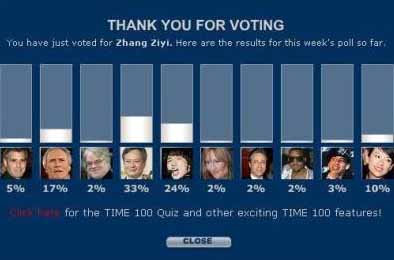
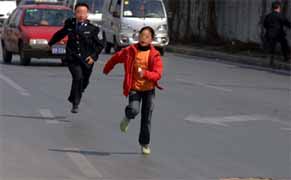
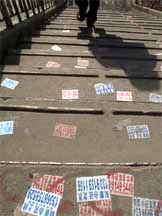
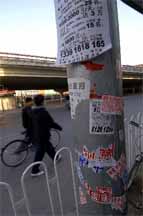
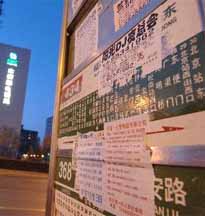
(translated summary) Two men posed as migrant laborers and entered a Beijing construction site, where they attempted to steal some electric wires to be resold. They wrapped more than 1,200 meters of wire around their waists, put on their jackets and then attempted to leave. They were stopped at the gate by the watchman who called the police. The watchman said, "There are no fat people among our construction crew, so there was definitely a problem with those two."
So what? Ah, but there is another story which could be written about the more general issue of there being no fat migrant laborers, at this particular construction site or anywhere else. From Ta Kung Pao:
(translated summary) According to Huaxia Times, eleven migrant workers in Beijing found their meals contained leftover food from other people's meals. A worker named Wang said, "As soon as I put my chopsticks into my lunch, I came up with a piece of chicken bone. The bone had been picked clean as there was no meat left." By custom, the workers had been getting only white tulip with their rice and this was the first time that they got chicken bones. That evening, they found bits of scrambled eggs in their food. At lunch next day, they found some fish bones. When asked, the foreman said: "The eggs were our leftover food. We did this for the sake of the workers. Someone people like to eat it. Of course, they don't have to eat it if they don't want to." As for the fish bones, the foreman said, "The cook must have picked up the bones while he cleaned up our table and dropped them into the workers' food by mistake."
As a result of the adverse publicity, the eleven migrant workers were sent away from the construction site. They have no employment now and they didn't even get paid.Eh, in case you don't get it, the above is pure snark and has no scientific basis.

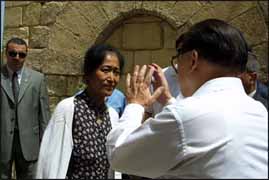
Why did the US Government give press accreditation to the Epoch Times, let alone Dr Wenyi Wang, to attend President Hu Jintao’s speech yesterday on the White House lawn? American officials must know that the newspaper is a Falun Gong front. They must know that Wang has a history of picketing consulates, asking anti-communist questions in press conferences and protesting against Beijing for harvesting organs from fellow disciples in prison camps and for canceling her passport. They must have known that she would take the priceless opportunity to go into hysterics during Hu’s proudest moment. They let her in deliberately. The only alternative explanation is an unbelievable degree of negligence. And why not? Limp-wristed, namby-pamby State Department protocol experts wouldn’t let George W Bush shriek “Hu, your days are numbered!” to the Chinese leader’s face himself. So this was the next best thing. And who better to do it than one of the demented followers of Law Wheel Qigong? The Falun Gong and the CCP are, to use one of Li Hongzhi’s own phrases, the Two Cosmic Extremes. “Only by Rectifying Ourselves and Assimilating to Dafa Can We Better Assist Master’s Fa-Rectification and Save People.” “Accelerate and Improve Party Reconstruction According to the Demands of the Three Represents.” It is hard not to conclude that they deserve each other.

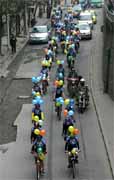

Female 1: Hey, I have an idea. Hey, sister, do you want our union to become popular? I'll make a forum post ...
Male 1: Let me tell you. It is really like that. Hey, our union is really ...
Female 1: You shut up. You go write the post. You write as my husband. Blue Devil writes as the husband.
Male 2: I can't write it, even though I want to.
Female 1: Let's post it at Sina.com.
Female 2: (sigh). Fine. You can write about my clothing shop too. Our union will become popular and so will my clothing shop.
Female 1: You can play-act the specially hurt character. You say, "I am not rich. I run a small clothing shop and I get abused ..."
Female 2: Then I will be infamous for ten thousand years.
Male 1: Aren't they talking about getting addresses ... I say, I tell them the actual address ... I say, I really give you the address and then will you go?
Male 2: Right. Give them the address ...
Female 1: Blue Devil, when you write it up, you remember to mention my unit as well. There are armed policemen at the entrance. They can't get in.
Female 2: If they go to your place, they are looking to die.
Female 1: If they want to come in, they will be treated as Fa*lun Gong ...This recording has led to broad discussions about moral malaise in general society as exemplified by these four people.

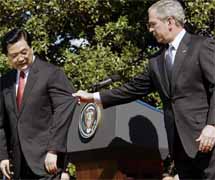
Related link: China and Its President Greeted by a Host of Indignities. Dana Milank, April 21, 2006.
Chinese President Hu Jintao got almost everything he wanted out of yesterday's visit to the White House.
He got the 21-gun salute, the review of the troops and the Colonial fife-and-drum corps. He got the exchange of toasts and a meal of wild-caught Alaskan halibut with mushroom essence, $50 chardonnay and live bluegrass music. And he got an Oval Office photo op with President Bush, who nodded and smiled as if he understood Chinese while Hu spoke.If only the White House hadn't given press credentials to a Falun Gong activist who five years ago heckled Hu's predecessor, Jiang Zemin, in Malta. Sure enough, 90 seconds into Hu's speech on the South Lawn, the woman started shrieking, "President Hu, your days are numbered!" and "President Bush, stop him from killing!"
Bush and Hu looked up, stunned. It took so long to silence her -- a full three minutes -- that Bush aides began to wonder if the Secret Service's strategy was to let her scream herself hoarse. The rattled Chinese president haltingly attempted to continue his speech and television coverage went to split screen.
"You're okay," Bush gently reassured Hu.
But he wasn't okay, not really. The protocol-obsessed Chinese leader suffered a day full of indignities -- some intentional, others just careless. The visit began with a slight when the official announcer said the band would play the "national anthem of the Republic of China" -- the official name of Taiwan. It continued when Vice President Cheney donned sunglasses for the ceremony, and again when Hu, attempting to leave the stage via the wrong staircase, was yanked back by his jacket. Hu looked down at his sleeve to see the president of the United States tugging at it as if redirecting an errant child.
Then there were the intentional slights. China wanted a formal state visit such as Jiang got, but the administration refused, calling it instead an "official" visit. Bush acquiesced to the 21-gun salute but insisted on a luncheon instead of a formal dinner, in the East Room instead of the State Dining Room. Even the visiting country's flags were missing from the lampposts near the White House.
But as protocol breaches go, it's hard to top the heckling of a foreign leader at the White House. Explaining the incident -- the first disruption at the executive mansion in recent memory -- White House and Secret Service officials said she was "a legitimate journalist" and that there was nothing suspicious in her background. In other words: Who knew?
Hu did. The Chinese had warned the White House to be careful about who was admitted to the ceremony. To no avail: They granted a one-day pass to Wang Wenyi of the Falun Gong publication Epoch Times. A quick Nexis search shows that in 2001, she slipped through a security cordon in Malta protecting Jiang (she had been denied media credentials) and got into an argument with him. The 47-year-old pathologist is expected to be charged today with attempting to harass a foreign official.
They're known as Internet evangelists -- the people who have unwavering faith in the democratizing power of the Internet. It's a term coined by James Mulvenon, deputy director at the Center for Intelligence Research and Analysis, to describe those who cling to the belief that the Internet "leads to 'tulip' and 'orange' and every other possible color and flower of revolutions around the world."
Then there's China.The Chinese Communist Party, long expected to be a victim of economic modernization and the transformative powers of technology, has instead been learning how to use those powers to its own ends. This isn't merely a matter of the widely publicized blocking of the Internet; the CCP has been learning how to use the Internet as a tool for surveillance.
"China is a clear example of how an authoritarian state can use modern information technologies to sustain itself in power," says Mulvenon, an expert on China and on information technology. They have been using technology to "create both low-tech Leninism -- seizures, arrests, informers -- and an environment of self-censorship and self-deterrence so they don't have to actively enforce."... The CCP's tight control on politics seems anachronistic in a society that is rapidly becoming more modern and permissive. "On the surface, we see a pluralism that's very obvious on topics like commerce, entertainment, fashion, sports, romance," says Perry Link, a Princeton University professor of East Asian studies. "This can lead the casual observer to the conclusion that a kind of liberalism has set in, and that's a serious mistake."
My current interest is in the political potential of the pluralism in topics like entertainment and society. What political potential? Once upon a time, in order to achieve certain political objectives, it was necessary to bring about a cultural revolution. Today, there is a cultural revolution being actively encouraged. Might it not be reasonable to assume that there will be political consequences?
As I cover each incident, I recognize that the impact may be tiny and obscure, but the cumulative effect will be huge. Here is one example: The Most Famous Pervert in China. Here, an ordinary tale of adultery became the biggest Internet story of the year in China. So what? What are the political implications? There may be little or nothing in the event itself, but there are tactical lessons. For example, after the initial story was posted at the MOP game forum, there was a huge response. Page views were occurring at the rate of 30,000 per hour and comments at 2,000 per hour. The MOP forum master declared that he had lost control of the usual process (namely, screening the comments and eliminating those that contained inappropriate content, such as threats of physical harm or private confidential information about people). Deleting the original post would not help, because there was already supposed to be another 1,400+ new forum posts on the same topic. The topic also spilled over to other forums (e.g. Tianya Club), where the response was also huge. So one effect was that people are now sitting back and looking at this incident with amazement.
The tactical lesson is this: when a suitable topic comes along, the response can be so widespread and powerful that it may be impossible for the legendary 30,000 plus Internet police or the surrogate censors at the websites, forums and blog service providers to filter or control. And that next great topic could just be political.
Rampini vergogna La domanda da fare, caro Rampini, non e` "quanti di voi hanno l'indirizzi a Yahoo?" Io ce l'ho, e ne sono ben contento. La domanda da fare e` "quanti di voi hanno comprato e comprano articoli Made in China?" (Lei per primo, tutti i giorni). Boicottare Yahoo! e non la Cina e` degno della parabola del fuscello e della trave (nell'occhio di Rampini). W Yahoo!
Matteo
noto solo ora l'articolo di Repubblica con lo stesso argomento del post di Rampini ( http://www.repubblica.it/2005/f/sezioni/scienza_e_tecnologia/cinaweb/liuxiaobo/liuxiaobo.html ) incredibile la quantità di imprecisioni contenute nell'articolo, che lasciano pochi dubbi sulla scarsa professionalità dei giornalisti che si occupano di questioni cinesi: Dall'articolo: "Per la seconda volta in meno di sei mesi la multinazionale americana collabora con gli investigatori per far arrestare un dissidente" ma poco dopo si afferma che le vicende trattate risalgono al 2003, mentre il caso di Shi Tao è del 9/2005..meno di sei mesi? il titolo dell'articolo: "Cina, un altro blogger in manette Arrestato dopo una "soffiata" di Yahoo!" ma Liu Xiaobo non ha mai affermato che l'arresto di Li Zhi è "dovuto ad una soffiata di Yahoo", limitandosi egli ad affermare ( http://chinadigitaltimes.net/2006/02/yahoo_helped_sentence_another_cyber_dissident_to_8_year_1.php ) che Yahoo collaborò con la polizia cinese molto prima del caso Shi Tao (come anch'io ho scritto nel mio post di ieri e come lo stesso articolo di Repubblica afferma in seguito)..ribadisco che un giornalista serio dovrebbe capire la diffe dovrebbe capire la differenza tra le due affermazioni.. Dall'articolo: "Interventi (anonimi) apparsi su alcuni blog cinesi, però, tendono a minimizzare il ruolo di Yahoo!, affermando in sostanza che le principali prove di accusa contro Li sono state le testimonianze di due agenti di polizia che si erano finti emissari del Partito Democratico" Interventi anonimi? forse per i giornalisti di Repubblica.. Il blog ESWN è conosciuto da chiunque si interessi della situazione dei media in Cina e il suo autore è l'universalmente rispettato traduttore Roland Soong, il cui blog è regolarmente visitato dai reporter del New York Times, Guardian, Washington Post, ecc. ( http://www.thestandard.com.hk/news_detail.asp?pp_cat=11&art_id=5573&sid=5396554&con_type=1 http://www.andresgentry.com/thoughts/2005/12/profile_roland_.html ) non sono affatto i blogger cinesi ad affermare che "in sostanza che le principali prove di accusa contro Li sono state le testimonianze di due agenti di polizia che si erano finti emissari del Partito Democratico" ma la stessa "memoria difensiva" redatta dall'avvocato specializzato in diritti umani Zhang Sizhi ( http://www.gbcc.org.uk/31article3.htm ) che è alla che è alla base dell'articolo di Repubblica ( http://www.zonaeuropa.com/20060209_2.htm ) e che evidentemente gli scrupolosi giornalisti di Repubblica non hanno neanche letto!!
I had to inspect the building of the showcase well-off village, so I hastily finished the luxurious banquet and hurried towards village X. As I was about to enter, a peasant saw me and very professionally came up to me. Thus followed the story that astonished me greatly as if I had attended a lively MBA course. In order to faithfully preserve the intent of the taxi driver, I have tried to reproduce his original words according to my memory.
"Where are you going? Village X? I am from the village. We are building a well-off society at Village X, and I am waiting for people like you to come. I wait here for two types of people -- government workers and poverty relievers. Do you know? Prior to speaking to you, I have circled around the village entrance twice before I decide to tell you what I think! Based upon the fact that you came in a small upscale sedan car, you must have a pretty high job post." ...
President Chen Shui-bian presided over the commissioning of the early-warning E2K planes recently purchased from the United States and an air force exercise at an air force base in the southern region of Pingtung yesterday. Chen also took the occasion to call for an earlier approval of his special military budget to procure new military hardware, which has been repeatedly blocked by opposition parties.
From Taipei Times:
The president yesterday criticized Chinese Nationalist Party (KMT) Chairman Ma Ying-jeou (馬英九) for agreeing to boost the nation's defense in their earlier talks but still blocking the US arms bill. "Chairman Ma agreed to support reasonable arms procurements and to boost the nation's defense in our April 3 talks, but the KMT has continued to block the arms bill in the legislature," President Chen Shui-bian (陳水扁) said yesterday. "I believe the delay in procuring advanced weapons for the military is very unfair to [the public]," Chen added. He said "the opposition parties are reckless in treating national security as child's play."
... Chen made the remarks while presiding at a commissioning ceremony for two E-2K Hawkeye aircraft at an air force base in Pingtung yesterday morning.
But the Chinese-language press covered a completely different aspect of the occasion which totally swamped out Chen's political message. The incident was very brief: when the president limousine passed in front of the assembly, the flag-bearer tilted the military flag forwards but the staff broke off and the flag dropped on the ground. The flag-bearer picked it up immediately. Chen was said to have "blew his top." Indeed, there was much more media coverage about the ill omen of the incident (觸霉頭) than the intended political message (see, for example, Apple Daily, China Times, United Daily, TVBS, ETTV).

Rise of the blog prompts China self-censor pledge
"Before the internet, there was no public space to articulate individual political opinion. What was one to do? Write a letter to a newspaper? Or publish your own book?" said Roland Soong, author of the influential Chinese language blog, EastSouthWestNorth.
... The blog of Michael Anti, an outspoken political blogger, was shut in December and writers have been jailed over the sensitive content of emails and postings.
... "Blogs are an important part of a sea change to a more open society. But will they bring revolution? I don't think so," said Jeremy Goldkorn, who runs Danwei, a website about media and advertising in China. "Most people don't really care about censorship. My impression is that the blocks are seen as an annoyance by most Chinese internet users, not as a huge problem," said Mr Goldkorn.

[in translation] My name is Kazia. I am an ordinary soccer fan. I regard the national soccer team's performance like an disappointed mother watching her failing child -- there is disgust, but still there is much more love. Fortunately, the World Youth Competition last year was eye-catching and brought happiness and hope to us. As an ordinary soccer fan, I can only use a simple and individual way to express my love and support for the Chinese youth team. If the Chinese youth team can win in the April 26 match against the Japanese youth team, I am willing to spend a romantic night with the best player on the field that day (如果中国国青队在4月26日的中日国青比赛中能够胜出,我愿意与当场最佳球员度过浪漫一晚。).
This is allegedly the first such public offer known in China.


(Apple Daily Taiwan, in loose translation) There is about a married couple in Chiayi, Taiwan. They attended a Presbyterian church, whose elder named Huang came to visit them at their home. The husband became suspicious when the elder started telling dirty jokes in front of the wife with a funny smile. One night, the husband told his wife that he was going to visit a friend in Taipei. Instead, he turned around and parked his car near his house. Soon he saw Huang enter his house. When he entered later, he found Huang and his wife in a naked embrace on the living room sofa. The husband would sue Huang for interfering with his family. Huang later told the wife that everything was God's will and that she should not admit to anything. But she confessed that she had made love to Huang for more than 20 times.

Very often, Huang picked up the woman and he drove to an isolated spot where they did the "vibrating car" thing. One time, when she went to use the bathroom in her house, Huang followed her and they made love. Another time, the husband was in the ground floor living room while the children were watching television upstairs, and Huang made love to her in the stairwell. Huang has been sentenced to six months in the district court, while a civil court has ruled that he must pay NT$1 million in compensation.Yes, but so what? This type of story happens often enough. Indeed, it would not be much of a story but for this front page photograph. This photograph was apparently taken when the husband barged into the house and then he grabbed Huang's hair from behind and held him still while a friend took photographs. This photograph is worth N number of additional copy sales.
A Taiwanese woman was remanded in custody yesterday after appearing in Tsuen Wan Court to face one count of trafficking in a dangerous drug. Fang Huei-ping, 28, was arrested at the airport on Tuesday after customs officers found 3.128kg of suspected heroin in her luggage. The case was adjourned to May 24.
So what? In Chinese, Ming Pao reports (in translation):
At 00:15, the female named Fang arrived from Kampuchea, took her luggage and was ready to enter Hong Kong. When she passed the customs station, the officer saw that she looked uneasy and asked her to put the luggage through the x-ray machine. There was nothing suspicious, but the officer asked her to open the bag. There were more than 10 bags of snacks, mostly famous Hong Kong products including seven bags of dried fruit peels ("Chan Pui Mei" 陳皮梅), dried squids and dried fish. The officer asked the female where she was coming from, and she said Kampuchea. The officer thought that a traveler from Kampuchea to Hong Kong should not have so many bags of Hong Kong snacks.
When the officer picked up the dried fruit peels, it felt heavier than usual. Upon further examination, it was discovered that the translation of the product on the package was "Cnan" instead of "Chan." The female was taken into a room for interrogation. The officer asked her why she was bringing so many bags of dried fruit peels into Hong Kong, she said that she liked eating them. The officer opened up one bag and observed that the female became very nervous. When he opened up one of the wrapped dried fruit peels, he stripped away the paper wrappings and examined the contents carefully. The dried fruit peel was larger than normal. Upon peeling off the outer layer, he saw a white object instead of the usual seed. The 8-gram object was taken to the laboratory for testing and found to be pure Number Four heroin.
Afterwards, the customs officers opened up all 391 dried fruit peels and found that every one of them contained heroin totaling 3.1 kilograms worth HK$1.4 million. After investigation, the customs officers found out that the female entered Hong Kong from Taiwan in late March and bought the dried fruit peels. She went through Singapore to Kampuchea and worked to hide the heroin inside the dried fruit peels. Unfortunately, she broke the wrapping and had to reproduce them. Her work was also perfect, including the serial numbers, but she made a spelling mistake in English and that was the key to breaking the case.
Isn't this much more interesting?
On October 31, I was on vacation and the judiciary department requested me to report on this case. But I needed to return home to attend the wedding of a relative and I did not attend. On November 4, I was called to Guangzhou. The request for us to withdraw from the case was clearer, and the requesting department this time is at a higher level. Under these circumstances, lawyer Guo Yan and myself had our contracts rescinded by our law offices on November 20 and 21 respectively. In the following days, our other clients were either forced to withdraw their appointment of us or else they abandoned their right to obtain justice through litigation. On December 27, in the cold wind and rain, I heard the news that Guo Feixiong and the other detained villagers have all been released without charges. I felt a little better.
The account by lawyer Guo Yan is a multi-part Internet post (Part 1 and 2; Parts 3 and 4; Part 5) that has not ended yet. Here is a sample excerpt:
We began to meet (with the detained villagers) at 11:40. We had originally planned to finish by 13:30. Yet, after I finished questioning the first person suspected of breaking the law, we revised the entire plan. After analyzing the verdict document and asking about the evidence and the facts, the two lawyers arrived at the same viewpoint. When I asked questions, lawyer Tang Jingling took notes and then we exchanged roles in questioning and note-taking. After the questioning of a suspect is completed, I took a photograph of the person and I gave reminders about points of attention and the relevant regulations. The circumstances of the arrests of these suspects were getting more and more ridiculous. Among them, one was arrested for being a spectator, one was arrested while driving a motorcycle, one was arrested while taking a photograph among the spectators ... whatever ... all seven were asked repeatedly: "Who is the big boss behind the scene of the villager assembly? Who provided the funds?"
At this point, the case of Taishi village must be the most documented case study of grassroots democracy in modern Chinese history through the contributions of so many different people. What is missing here? The stories by the villagers themselves, but that will presumably happen one day soon. There are also the stories by the government officials, the police and the hired enforcers, but that will presumably never happen.


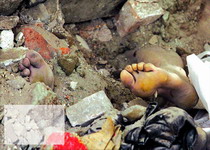
[in partial translation: Please note that this translator believes that the original transcription contains significant errors and therefore this is a corrected version based upon his personal judgment]
... I believe that the reform ran into some problems due to background factors. I know of two background factors which I will expound further upon. First, as Li Shuguang had mentioned, the reform of an economic system inevitably causes certain unilateral breakthroughs. When Tocqueville analyzed the American and French revolutions, he wrote that many national revolutions will fail not because they refused to reform but because they reformed. They would have remained peaceful if they did not reform. The reform actually brought violence. Therefore, during the reform process, unless there is general coordination such that all the legs move forward at the same time, a reform may cause many big problems, or there may be even worst social problems as a result of the reform.
The second factor concerns the overall direction of the reform. For convenience, we shall say 'left' and 'right.' The friends on the left have clearly defined flags and banners and they flash out their theories (such as socialism). They can say that they want to adhere to the legislative tradition during the establishment of socialism and they will even say that there is no risk even if we follow the same path that led to the Soviet Union of today. Perhaps the government is scared of this approach and it hits them in a soft spot. So the committee chairman immediately dispatched senior cadres to ask them about how to reform and so on.
Meanwhile, those who stand on the right have to be evasive and secretive, or even taciturn at times because there are some things that cannot be spoken publicly ... Where should we go? We have a goal, but we cannot talk about this goal in practice. For example, we will surely head down the path for a multi-party system, freedom of press, genuine democracy in this country, genuine personal freedom, the national rights being built upon guaranteeing personal freedom, following the current Taiwan model, etc. We think that China ought to move in that direction, but we cannot say that right now. Since we cannot say that, then this is like a good person not being fight a bad person. When a good person fights, he will die on the battlefield. Therefore, the leftwing stuff is rampant on the Internet, but the people on the other side cannot explain or clarify. Even though we have tried hard to push the reform of the system over these years and the people present here have put in a lot of effort, this process has been difficult and filled with sweetness and bitterness.
...
My various speeches have been disseminated on the Internet. I clearly said that I hope the Communist Party can form two factions, I hope the military can be nationalized, I hope we can settle the major issues of right and wrong, I hold a constructive attitude, and I hope for freedom of press. This includes the letter from the thirteen scholars, in which we offered our views. We believed that freedom was violated and the law was trampled upon. There is an extra-legal organization which has repeatedly made life-and-death decision with respect the media, so what kind of system is this? It is a serious violation of the Constitution ... the Central Propaganda Department, the League Central Propaganda Department and our entire Party are unregistered. In a democratic country, the most basic requirement is that an organization should be qualified, and can sue and be sued under the law. We don't have that. We joined this organization. I have been with this organization for more than 20 years. But it is not registered. This is a troublesome matter, because what right does it exercises? It is an extra-legal right. This is seriously illegal, because we cannot talk about ruling the country in accordance with the law. Comrade Hu Jintao said we must seriously make corrections, and the National People's Congress as well as various levels of People Congresses must seriously correct various unconstitutional activities, but he himself is an extra-legal entity. How is the Constitution being violated? We cannot even begin to talk. If we clearly and explicitly state this viewpoint, will it make for a better language of discourse for reform? Some people lean towards saying the reform was wrong, but that is not necessarily correct. ... First, there are some people who adopt silence and endure humiliation in order to move forward without saying the wrong things. Second, there is a group of people who are not enemies of the system and they clearly expressed themselves as such, and they offer a better balance. I spoke in the past of a third group of people who often become enemy forces. At a time when the contradictions between us and them exist in abundance, many people speak of how the overseas hostile forces are joining with the ones inside China. We want to be distinguished from the enemies. We are not the enemy. We are friends. We are not just friends, because we love you a lot. We speak up because we love the Party. If we did not have love, we would have shut up. Therefore, this is the system that I want to form.
My particular take is this: The challenge posed here is how one can reconcile direct democratic elections with transforming this particular bureaucratic culture that runs China right now. The central undisputed fact is: this is how the government is being run now. Do you think holding a direct election at any level will change anything under these circumstances? A good exercise would be to reconcile Section 4 (The Elections) of this post here with what happened in Lu Banglie at Baoyuesi Village. Lu was directly elected but he ran smack into the bureaucracy which refused to cooperate with him. It is not enough to talk about direct elections: you must figure out how to transform this bureaucratic culture or else you are doomed even if elected.
Perhaps I can direct your attention to the beginning of John Gray's essay The Global Delusion in the New York Review of Books:
For the past two centuries leading social theorists have believed that modern development can have only one outcome. In the nineteenth century Karl Marx, Herbert Spencer, and Auguste Comte asserted that the advance of science and technology was leading to a single type of social organization, and unless modern societies foundered in a reversion to barbarism they were bound to converge in a global system. There was wide disagreement on the nature of the system that was coming into being. According to Comte it would be a kind of technocracy, while Marx believed it would be egalitarian communism and Spencer laissez-faire capitalism. In each case it was a version of industrial society that enabled scarcity in the necessities of life to be overcome. Despite their different political visions these thinkers were at one in assuming that with the advent of industrialization prosperity could be ensured for all. Once this had been achieved, war would cease and a universal economic system would replace the diverse and conflicting regimes of the past.
Similar beliefs shaped the thinking of many twentieth-century social theorists. In the Thirties F.A. Hayek resuscitated a version of Spencer's theory of the free market as the endpoint of social evolution, while Sidney and Beatrice Webb believed an early version of the universal society of the future was embodied in the Soviet Union. During the Sixties theorists of the "end of ideology" such as Daniel Bell anticipated that centrally planned economies and market-based affluent Western societies would come together in a managerial mixed economy. Toward the end of the century the idea became fashionable that societies everywhere were embracing "democratic capitalism."
None of these expectations has been borne out by events. Industrialization is spreading everywhere, but at varying rates of rapidity and with disparate consequences. As in the past, societies are developing in widely different directions. In parts of the world the state has foundered and been replaced by anarchy; in others authoritarian regimes remain strongly entrenched. The former Soviet Union converged with the third world rather than the affluent West and has been replaced not by liberal democracy but by a hyper-modern version of traditional Russian authoritarianism.Versions of liberal democracy have spread into parts of the former Soviet bloc, but in Iraq democracy is producing a type of elective theocracy not unlike that which exists in Iran. China has abandoned central economic planning for a type of state capitalism closely linked with nationalism. Some countries are moving toward market reform and others in the opposite direction. Europe has opted for a combination of social democracy with a neoliberal economic system, while under the Bush administration the United States has tilted toward a mix of protectionism, an unsustainable federal deficit, and crony capitalism.
Though the world's diverse societies are continuously interacting, the process is producing a variety of hybrid regimes rather than convergence on a single model. Yet a belief that a universally accepted type of society is emerging continues to shape the way social scientists and public commentators think about the contemporary condition, and it is taken for granted that industrialization enables something like the way of life of rich countries to be reproduced everywhere.This is a double whammy: even if you hold direct elections, you won't necessarily end up with the United States of today in China. Besides, you would not want to have "a mix of protectionism, an unsustainable federal deficit, and crony capitalism" plus racial/ethnic discrimination, religious fundamentalism and hegemonic foreign policies in China, would you?
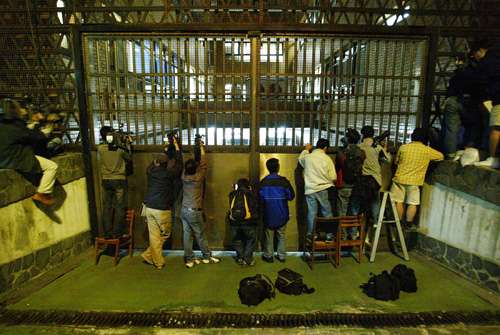

[in translation] I feel that those who are involved in culture in China must have the expectation and desire to bring back the classical stuff. We have all undergone similar experiences, because the capitalism and militarism of the western hegemonies invaded us and disrupted and overthrew our order. In my personal reflection, there are going to be a period of awkwardness full of struggles during the period of adjustment. Right now, the Chinese economy is slowly rising and the environment is more or less destroyed, I feel that the things of the past are returning. People will have a longing for the past. It will not be a total acceptance, but after examination and absorption, I hope that there will be a new life and a continuity. This is what I want to believe.
Between western movies and Chinese movies, I would obviously choose to make western movies. In my personal life as well as my creative life, they are more established. But Chinese movies are something that I cannot let go. I have the responsibility and the psychological need, but I would be relatively more scared.
Here are more details from Yazhou Zhoukan (via ChineseNewsNet):
At 11:02am on March 24, former Freezing Point editor Li Datong received Yuan Weishi's response to Zhang Haipeng's critical essay Anti-Imperialism and Anti-Feudalism in Modern Chinese History. Yuan attached a brief note that asserted: "Freezing Point published an article critical of my essay. Based upon the accepted standards of academic discussion, I have the right to respond" and hoped for quick publication. Li Datong forwarded Yuan Weishi's note and essay to China Youth Daily Freezing Point editor-in-chief Chen Xiaochuan and deputy editor-in-chief Dao Yongtao and asked them "to give Mr. Yuan a formal reply, no matter what the result is."
Through company internal email, Chen Xiaochuan replied that "there is no intention to continue the discussion on this problem" and the exchange between the Yuan and Zhang articles "has come to an end." Li Datong disagreed with this view because he thinks that Zhang is criticizing Yuan and if Yuan's rebuttal is not published, "it will lead to more coverage by the overseas media" that will create a bad influence on the reputation of Freezing Pont. Li suggested that selected portions of the historical analysis can be published, and that would do more good than bad for the authorities, the League Central, Freezing Point and its editor-in-chief.
On the morning of March 25, Li Datong read a report in Hong Kong's Wen Wei Po: "Beijing, March 24, reporter Han Xiao: Earlier, State Council News Office director Feng Xiwang participated in a friendly gathering with Hong Kong media based in Beijing and claimed that mainland news administration is moving towards being more open, transparent and relaxed. During the discussion, Feng responded to this reporter's questions about Freezing Point, Public Interest Times and other matters. Feng said that the reports about Freezing Point quoted only the contents of former editor Li Datong's open letter without including the explanation of the relevant authorities. He has not read Yuan Weishi's article in Freezing Point. After Freezing Point published Yuan's article, some readers wrote to the newspaper and its management to complain, and that was why the China Youth Daily administration decided to suspend the magazine for re-organization. The re-launched Freezing Point published Zhang Haipeng's critique of Yuan Weishi's points of view and Yuan can respond with his own viewpoint. This proves that there is adequate freedom of speech, and there is nothing about clamping down on speech or restricting freedom of speech." On that day, Li Datong forwarded the Wen Wei Po article to Chen Xiaochuan and left a message to Chen that "If we don't publish this, we are making the State Council News Office liars and that would be very embarrassing."
At 4pm on March 27, Freezing Point editor-in-chief Chen Xiaochuan had not replied to Li's March 25 message. So Li called Chen directly to see if there are new considerations. Chen said that publication will not happen and he had not even consulted with the League Central on this. Li Datong said that this will "bring another round of reports by overseas media." Chen said, "If they want to report, let them report."
Yuan's rebuttal was ultimately not published in the Freezing Point magazine of China Youth Daily.
Although Yuan's rebuttal was not published in the magazine, it has been distributed on the Internet (for example, see here).
There are two versions about what happened. In the broadcast program, the cat was not hurt and walked away quickly as soon as it touched the ground. In the other version, an eyewitness said that the cat was unconscious and immobile when it touched ground and a person in white robe quickly fetched the cat and took it away. The only thing for sure was that the television program host Wang Yang (汪洋) has been pilloried! His defense: "But I wasn't the one who let the cat drop!"
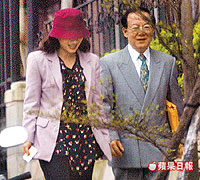
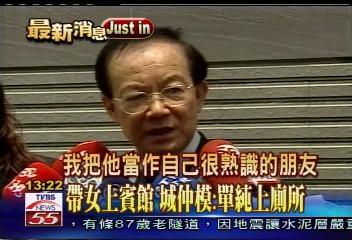
[in translation] Suppose that the following multiple-choice question appears in the basic knowledge test for high-school students: You are driving and suddenly you have a stomach ache. What will you do?
(1) Find the nearest gas station
(2) Find the nearest fast food restaurant
(3) Take care of business by the roadside under cover
(4) Find the nearest motor inn, rent a room and use the restroom
99% of the examinees will get the wrong answer because none of them will imagine that the correct answer is (4), and that it would take 70 minutes to use the restroom!According to the Apple Daily automated telephone poll of 420 persons (note: smallish sample, unreliable methodology), the responses to the question "Do you believe that Cheng Chung-mo took the woman to the motel to use the restroom on account of a stomach ache?" were: 80% no; 13% yes; 8% don't know/no opinion. When Cheng was asked why they did not use a gas station restroom, he said that the female was particular about cleanliness.
When the female was reached by Apple Daily, she said: "He wasn't offering me any legal advice. I did not have a stomach ache that day. I was physically fine." Supposedly, Cheng will turn in his resignation as Judicial Yuan Vice President and Grand Judge shortly. The first rule of conduct for judges in Taiwan is that they should avoid improper conduct (or even conduct that may be perceived as improper). As with the Watergate break-in, the bigger issue is the cover-up afterwards. Cheng's initial response to the story was to insist that he had stayed home all day, and then his story changed after the photos appeared in print.Here is some more from the China Times editorial:
[in translation] I remember that in elementary school, the teacher taught the story of Washington cutting down the cherry tree about the importance of "honesty." As people get older, "honesty" became less and less important for some people, because "honesty" is just one option when they have to handle a problem. Depending on the severity of the incident and an assessment of the severity of the damage, they may decide whether to be "honest" or to muddle their way through. In today's society, isn't there the "three-day media effect"? After three days, who is going to remember what I said? Who is going to remember that I muddled my way through?
Barristers, however, have never been slow to talk (and talk and talk and talk) about things on which they only briefed themselves yesterday. Mr Tong was certainly quick to do so. His remarks came in a press release in which he announced that he and a party colleague will chair a new Antitrust and Competition Policy Bureau.
Quick indeed. If you have not heard any official announcement of this commission yet, you will just have to be content with Ronny's assurance that "the government will issue its own statement on the issue later this week". This statement, he says, is expected "to cite the important issue of providing jobs for the underprivileged in the legal profession".
Got it. The Civic Party may tell you that it is not, emphasize not, just a barristers party. No, not at all, far from it, perish the thought. That is why you get just the usual obsession of barristers with barristers when you scratch its surface. Might it be a good idea, Ronny, to provide jobs for the underprivileged in other professions as well? Why mention only the legal one? And can lawyers not hire the underprivileged without a new commission to tell them to do so? How many have you hired in your own chambers?... May I suggest, Sir, that you indulge your absolute freedom to step into a courtroom? Then do us all a favour. Stay there.
From the April 6, 2006 issue of Next Magazine, p.110:
[in translation]
April 1st is Fool's Day. On the Internet, an email under the cane of the Civic Party was widely circulated. Party-founder barrister Ronny Tong was quoted as saying that the Civil Party is serious about promoting socialism as the ideal. This email also stated that the government will spend HK$401 million to set up an Anti-Trust and Competition Commission headed by Ronny Tong.
Three days later, on April 4, the South China Morning Post took this email seriously through its business/finance columnist Jake van der Kamp, who criticized Ronny Tong heavily for ignoring the market. Well, of all things, Jake van der Kamp became the number one fool of the year.
Forgetting about anything else, it is not easy for the government to allocate HK$401 million to set up a policy commission. Don't you think that they would have to go through the Legislative Council? Without even such basic knowledge, it is still possible to get a space to write a column. You tell me how easy it is to get a job if you know English. Dear fellow students, please learn English well!
Is it ethical for busy public figures to charge fees for interviews? At the same time, is it incumbent on them to answer every journalist's queries despite their busy schedule? Renowned Chinese sociologist and sexologist Li Yinhe, who has charged money for interviews and set off a debate, has defended her move.
... The reporter was told that he had to pay to get the interview 500 yuan (US$61.7) per hour with the first 15 minutes free of charge. After a one-hour question-and-answer session, the reporter paid the fee. Li admitted in her blog on Sina.com, a Chinese language website, that she had previously charged foreign journalists for interviews. The British Broadcasting Corporation (BBC) paid Li 50 pounds (700 yuan) for a 5-minute interview and Hong Kong-based Phoenix Satellite Television offered her 500 yuan (US$60) for a 15-minute interview.
So what is the policy here at the EastSouthWestNorth blog? By choice, this website draws zero income. There are no Google AdSense ads, Amazon.com affiliate programs, and Paypal buttons.
Furthermore, I have gone out of my way to make sure that there are no interviewing fees, even if offered. For example, when I did the BBC 4 Radio interview (about 5-10 minutes) in New York City, I was asked for my address to which they can send payment, but I declined. As another example, when I did the BBC World Radio interview (about 25 minutes) in Hong Kong, I was offered reimbursement for my taxi fare, but I declined. More generally, I asked to attend an overseas conference for which transportation and lodging were offered. But I declined the offer and will pay my own way (asking them to save the money for a truly needy person). This is extreme, and it is possible only for someone who can afford to behave in this way. So much for this issue.
It is the police force's practice to allow undercover officers to receive certain sexual favors in order to collect evidence targeting triad-controlled establishments offering sex services. ...
Principal Assistant Secretary for Security Apollonia Liu said it is clearly stated that sexual intercourse and oral sex are not allowed, and that operations are targeting organized sex services controlled by gangsters only, not individual sex workers. "A limited level of sexual services is allowed to protect the identity of undercover police officers," Liu said. "[Officers conducting investigations into] massage establishments offering sex services will normally take more than one visit before collecting enough evidence.
What exactly is being talked about here? What is a 'limited' sexual favor that is neither sexual intercourse nor oral sex? Why can't it be explicitly stated?
From Ravina Shamdasani at SCMP:
Sexual intercourse and oral sex were strictly forbidden for officers investigating sex offences, the government told the Legislative Council panel on security but sometimes masturbation was OK, particularly when undercover agents had to "receive some form of sexual service in order to maintain cover".
Thus, the specific sexual act being discussed is masturbation (that is, a hand job).
According to Ming Pao,
議員何俊仁批評當局「用花言巧語詭辯」,十分可恥。他質疑,臥底毋須待完成手淫服務後才表露身分,除非他們需要以體液作呈堂證供。
[in translation] Legislator Albert Ho criticized the authorities for being shameful in their fancy excuses. He questioned whether the undercover police officer needed the hand job to be completed before identifying himself -- unless, of course, they needed to present body fluids as evidence in court.
But according to Justice Department senior lawyer Chan Wing-han, as reported in Oriental Daily:
警 員 放 蛇 時 接 受 性 服 務 的 程 度 , 須 視 乎 搜 證 需 要 , 及 避 免 身 份 被 識 破 , 若 要 檢 控色場所 經 營 者 , 法 例 要 求 須 搜 證 一 次 以 上 , 故 警 員 要 放 蛇 多 於 一 次 , 而 為 免 被 妓 女察 覺 表 現 有 異 , 警 員 無 可 避 免 要 與 妓 女 有 身 體 接 觸 , 或 接 受 某 程 度 性 服 務 。
[in translation] The degree to which police officers can receive sexual services depends on the evidentiary requirements and avoidance of being detected. If the law requires more than one occasion of evidentiary collection against an operator, the police officer must go undercover more than once. In order to make sure that the sexual workers does not detect anything unusual, the police officer must unavoidably have bodily contact with the sexual worker, or receive a certain degree of sexual service.
Thus, if a police officer goes into a massage parlor, he can get a regular massage but there would be no crime. He can get an 'irregular' massage but that would be just a one-time-only event and insufficient to prove that this was an organized brothel operation. Therefore, he needs to get a full 'irregular' massage on the first visit, and then he can come back and make an arrest at the start of the second 'irregular' massage as proof that such sexual service is being offered consistently at the location.
Also from SCMP:
Principal Assistant Secretary for Security Apollonia Liu said it was difficult for the police to find officers willing to undertake such operations. "Many of these establishments are run by triads. Are the officers really enjoying receiving sexual services when they could lose their cover at any time and be attacked?" she asked.
Another way to put this: Why are you here if you won't let the sex worker touch you? Are you an undercover police officer or what? You will have to prove yourself by getting a handjob!
P.S. Another ramification: If the sex worker should be under 16, then the police officer is committing a crime if he receives a sexual service during the course of the undercover operation. The logical conclusion would be for the operators to hire only minors ...


Somewhere out there, there are a couple of anonymous and faceless people who enabled Sister Hibiscus to become such a public figure. On her own, Sister Hibiscus could never have achieved these heights. The gatekeepers at the key BBS's were the ones who promoted Sister Hibiscus, and they had the ability to feature her repeatedly at the home pages of their tremendously popular BBS's (with millions of visitors per day). I have to wonder if these anonymous people deliberately chose an unlikely figure precisely to test if they have the power to sway popular preferences. So now that they have proven to themselves that the power is there, what next? How will they use that power? How will they derive financial value from that power?
For the latest Internet star The February Girl, a similar argument has arisen with this Tianya Club commentator being quite unhappy:
[in translation]
There is an exploratory academic piece titled "What is February Girl so popular?" on the Internet. To put it plainly, it was soft advertisement. Here, I characterize this as "academic" because the author is named Chen Mo (陳墨). I know this Chen Mo, but not too well. He is supposedly a photographer, and he likes to plan for the packaging of new Internet personalities. He is something like an amateur star scout ...
Chen Mo's article began with a bunch of data to explain the popularity of February Girl: "If you search on Google, you will get more than 1,360,000 results related to February Girl!" So this caused me to wonder. If a Google search can explain anything, then with due respect, I just entered the random word "Pig" into Google and received 18,700,000 related results. So even a pig is more popular than her.
Then he wrote: "Actually, this was just something brought about by a pre-planned discussion of her work ... the first step ... her work was recommended by highlighting the title in bold color; the second step, ... famous Internet writers were recruited to comment, support, defend and generally create noise; the third step, the effort was made to promote February Girl and her work onto a Tianya Club front page headline item. But Tianya Club's process was too ineffective and insensitive, and February Girl's headshot and post did not become a Tianya Club after N days. At the moment, her post at Sina.com drew the admiration and attention of me and Xiaochu (笑楚). At our recommendation, Sina.com placed her photograph and post as the top headline of the channel! The next day, we immediately saw Tianya Club followed by putting February Girl on its headline news. After that, Netease and QQ followed suit ... the traditional newspaper and magazine reporters then followed up, and so ..."
The above mainly describes the planning talents and hyping talents of the Sina.com forum masters. They seemed to have an operational process so that Tianya Club, QQ and media reporters who don't know anything just followed their lead. A small website will always be a small website, and it only knows how to wave a flag and cheer. In this way, February Girl became popular even before she finished exhibiting her breasts. As for Chen Mo, his Sina.com finished the hyping assignment ahead of time.
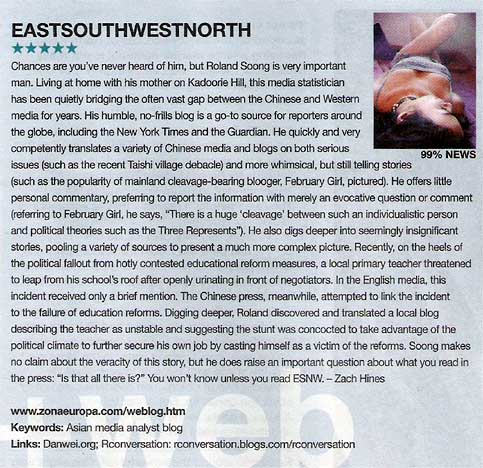
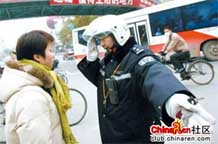

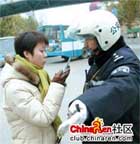
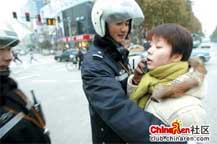

Archives